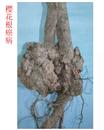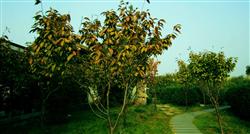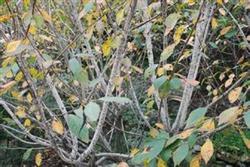How to prevent and cure cherry blossom root nodule disease?

How to prevent and cure cherry blossom root nodule disease? The gorgeous cherry blossoms are very popular, but they are susceptible to a fatal root nodule disease. The disease mainly occurs on the trunk and lateral branches of the root and aboveground parts of cherry blossoms. In the early stage of the disease, the rhizome was swollen with a spherical or hemispherical tumor, and the young tumor was white, soft and smooth. After that, the tumor gradually enlarged, the texture became hard, brown or dark brown, the surface was rough and cracked, and gradually infected to the main root, lateral root and even capillary root from the rhizome, and each node expanded into tumors of different sizes. as a result, the cherry blossoms grew slowly or even stopped growing, and the whole plant withered for 3 to 5 years. The incidence of seedlings is high, especially in the scion junction of grafted rootstocks. This is caused by bacteria of the genus Candida. With the spread of air and Rain Water, the wound is easy to be infected. Prevention and control methods: 1. Strict quarantine control. Diseased seedlings are found to be destroyed on the spot, and the purchase of diseased seedlings is prohibited. two。 Carry out crop rotation. For plots that have suffered from cherry root nodule disease, diseased trees and diseased roots should be thoroughly dug up and burned, and tree species should be renewed, and cherry blossoms should not be planted within 3 years. 3. Physical control. When the cherry blossoms were dormant in late autumn and early winter or early spring, the diseased trees were dug up, the root nodules were cut, and the wounds were smeared with 500~1000ppm 's oxytetracycline, and then transplanted to disease-free areas with better site conditions for fine management. 4. Before the arrival of rainy season, ① was irrigated with 300 × 400 times of "402" every 10 days for 3 consecutive times, and the effect was better. When symptoms were found in the growing season of ②, the tumor was removed in time, and the wound was smeared with 1000~2000ppm streptomycin or 500~1000ppm oxytetracycline, and then buried. ③ soil was disinfected with cobalt chloride or mercuric water. Before planting ④ seedlings, the roots were soaked in 500~1000ppm streptomycin for half an hour, or soaked in 1% copper sulfate solution for 5 minutes, rinsed with clean water and then planted. Click for more cherry blossom planting techniques click to get more flower planting techniques
- Prev

Why do cherry blossoms shed their leaves ahead of time?
Why do cherry blossoms shed their leaves ahead of time? Please guide the cherry blossom normal defoliation is in September, cherry blossom early defoliation, there may be three reasons. First of all, there are insect pests. Longicorn beetle larvae under the bark at the base of the trunk can cause the whole branch to fall leaves ahead of time, and if the larvae are in the main root, it will cause the whole tree to fall leaves ahead of time, so check whether.
- Next

How to control the cherry blossom mulberry white shield scale?
How to control the cherry blossom mulberry white shield scale? Please introduce the method of cherry blossom mulberry white shield scale mainly distributed in the cherry blossom cultivation area, the occurrence is common, due to the current suitable climate, high humidity in the field, the occurrence is quite serious in some fields. The damage has caused the leaves to basically fall off, and the number of insect population is extremely high and dense, which can be seen as snow white in the near future. According to.
Related
- Fuxing push coffee new agricultural production and marketing class: lack of small-scale processing plants
- Jujube rice field leisure farm deep ploughing Yilan for five years to create a space for organic food and play
- Nongyu Farm-A trial of organic papaya for brave women with advanced technology
- Four points for attention in the prevention and control of diseases and insect pests of edible fungi
- How to add nutrient solution to Edible Fungi
- Is there any good way to control edible fungus mites?
- Open Inoculation Technology of Edible Fungi
- Is there any clever way to use fertilizer for edible fungus in winter?
- What agents are used to kill the pathogens of edible fungi in the mushroom shed?
- Rapid drying of Edible Fungi

